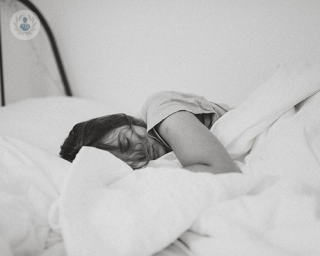Sleepwalking
Professor Matthew Walker - Neurology
Created on: 02-28-2017
Updated on: 10-02-2023
Edited by: Sophie Kennedy
What is sleepwalking?
Sleepwalking is a type of parasomnia and a sleep behavioural disorder that occurs during deep sleep. Someone who is sleepwalking is in a state of being asleep and awake at the same time.

Symptoms of sleepwalking
Someone who sleepwalks can be identified by the following points:
- Being in a state of sleep and either able or unable to respond to communication. This can be referred to as sleep talking
- Their eyes may be open
- They can be disorientated upon waking up
- In the morning they do not remember performing activities like cleaning, cooking or simply walking around
Medical tests to diagnose sleepwalking
People who believe they sleepwalk may be physically evaluated by a specialist to rule out other potential causes such as panic attacks, seizures that occur specifically at night and other sleep disorders.
A discussion may be held between you and a specialist to determine if the behaviour fits the description of sleepwalkers. Furthermore, a sleep study (clinically referred to as a polysomnography) could be held. This involves staying in a clinic or hospital overnight and monitoring the brain waves.
What are the causes?
Sleepwalking can be a hereditary condition that runs in families. It may also be caused by an extreme lack of sleep or a result of other sleep disorders, such as restless legs syndrome or obstructive sleep apnoea.
Can it be prevented?
There are lifestyle factors that can be looked at to reduce the likelihood of sleepwalking occurring:
- Resolve snoring problems
- Avoid caffeine at night
- Try to reduce general anxiety and stress levels, particularly before bed
Medication may contribute to the likelihood of sleepwalking episodes. Discuss with your specialist if your medication needs adjusted or changed.
Treatments for sleepwalking
This involves treating underlying conditions and addressing potential triggers to prevent the likelihood that sleepwalking occurs. Your specialist will assist with identifying triggers and provide you with information on medicinal changes or with clinical help such as therapy or counselling to reduce stress and anxiety levels.
Which type of specialist treats sleepwalking?
Neurologists can diagnose and treat sleepwalking.


